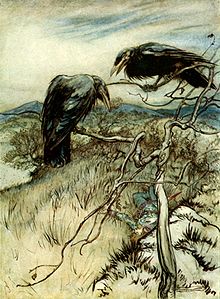
Back Die drei Raben German Tri Korvoj Esperanto Los tres cuervos Spanish The Three Ravens French De Twa Roeken Frisian שלושה בני עורב HE The Three Ravens Italian The Three Ravens NN Os Tres Corvos Portuguese Три ворона Russian
This article needs additional citations for verification. (June 2024) |

"The Three Ravens" (Roud 5, Child 26) is an English folk ballad, printed in the song book Melismata[1] compiled by Thomas Ravenscroft and published in 1611, but it is perhaps older than that. Newer versions (with different music) were recorded right up through the 19th century. Francis James Child recorded several versions in his Child Ballads (catalogued as number 26).
The ballad takes the form of three scavenger birds conversing about where and what they should eat. One tells of a newly slain knight, but they find he is guarded by his loyal hawks and hounds. Furthermore, a "fallow doe", an obvious metaphor for the knight's pregnant ("as great with young as she might go") lover or mistress (see "leman") comes to his body, kisses his wounds, bears him away, and buries him, leaving the ravens without a meal. The narrative ends with "God send euery gentleman / Such haukes, such hounds, and such a Leman".
- ^ Thomas Ravenscroft, William Ravenscroft (1611). "Covntry Pastimes". Melismata. p. 20. Retrieved 2007-08-15.